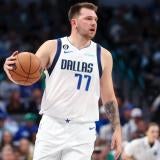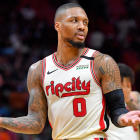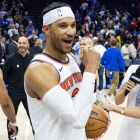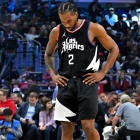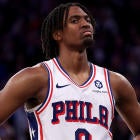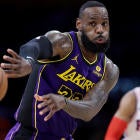The Portland Trail Blazers started 2020 with a whimper. On New Year's Day at Madison Square Garden, the New York Knicks ran circles around them, with center Mitchell Robinson throwing down dunk after dunk. Portland's pick-and-roll defense often looked helpless, surrendering easy lobs as Robinson rolled down the lane untouched.
It was the Blazers' fifth loss in a row and the Knicks' most lopsided victory of the season, 117-93. Coach Terry Stotts said the overall theme had been inconsistent defense, but the specifics change night to night. CJ McCollum said their issues were transition defense, giving up offensive rebounds and fouling too much.
"We got a lot to figure out," Damian Lillard said. "It seems like it's something new every game."
Lillard, the Blazers' franchise player, lamented that they let New York do whatever it wanted, and they needed to have better communication and protect the glass. He also said that, as professionals, they had to keep working and try to find a solution, even though they were 14-21. After all, they were still in the playoff race.
A week later, Portland is 16-22, thanks to Carmelo Anthony's midrange game-winner against the depleted Toronto Raptors on Tuesday. Its net rating is minus-1.6, which ranks 18th in the league. This is a drastic decline from last season, in which the Blazers were seventh in net rating and won 53 games. That they are only half a game out of the playoffs says more about the state of the Western Conference than about them.
Lillard, 29, is in his prime, having another spectacular individual season. After a poor start, McCollum's numbers are virtually identical to last year's, too. When both guards are on the floor, the Blazers have scored 113.3 points per 100 possessions, but that drops by about eight per 100 when either of them sit. Portland has responded to this by bumping their minutes up to almost 37 per game, and its offense, which ranks 11th in the league and ninth since Anthony's arrival, is largely fine, even though it is less dynamic than it would be if Jusuf Nurkic, Zach Collins and Rodney Hood were healthy.
The Blazers are 23rd in defense, though, playing their typical conservative scheme but executing it poorly. They are actually 11th in defensive effective field goal percentage, which is a slight improvement, but that is negated by them giving up tons of shots at the rim and significantly more 3-pointers than last season. In Cleaning The Glass' geeky metric called "location effective field goal percentage," which strictly measures a team's shot profile, Portland has dropped from 9th to 26th defensively. It has not helped that Portland has gone from a good defensive rebounding team to a terrible one, nor that it has had trouble keeping teams off the free throw line.
The simple explanations: Lillard and McCollum have never been particularly physical defenders, and they miss Al-Farouq Aminu and Moe Harkless helping them out with their size and versatility. Opponents predictably target the Anthonys (Carmelo and Tolliver) in pick-and-rolls. Hassan Whiteside is the Blazers' only shot blocker, and while he looks the part of a dominant defender, teams routinely attack him in pick-and-rolls, too.
In Portland's 122-111 loss to the Miami Heat on Sunday, Goran Dragic shredded its defense. Dragic had 29 points and 13 assists, both season highs, in just 30 minutes. He did this largely by exploiting Whiteside, his former teammate:
On The Habershow with Tom Haberstroh, Yahoo Sports' Chris Haynes said that the Blazers would likely trade either Whiteside or Kent Bazemore, as Lillard "didn't sign up to be on a team like this." If Neil Olshey's front office moves one or both of those expiring contracts to address the Blazers' short-term issues, though, it shouldn't be about getting more firepower. It should be about solidifying their defense.
Portland has been linked to Kevin Love forever, and while he'd look great in Stotts' system and help with rebounding, I don't think he's the answer. I am more interested in guys like Derrick Favors, Robert Covington and Aron Baynes, if they are available. Marvin Williams would be a nice fit, too, and Marcus Morris would fit on both ends. The real question, though, is how determined the Blazers are to do something to salvage the season.
The idea of trading McCollum comes up every year, but if they ever actually do it -- and risk alienating Lillard in the process -- they better be sure it's the right deal. I would be shocked if Olshey parted with Collins or second-year guard Anfernee Simons. It is easy to say that Portland owes Lillard some kind of help, but if those guys aren't the sweetener in a deal involving Whiteside or Bazemore, future draft picks will have to be. Is that worth it?
Twelve of Portland's next 16 games are against teams with plus-.500 records. If the Blazers don't make a meaningful move soon, things could get extremely ugly, in which case there would be a strong case for standing pat or at least focusing only on deals that help them in the medium-to-long term. Maybe Nurkic will return next month and provide a boost. Maybe Collins will get back on the floor sometime after that. As frustrating as this season has been, Portland doesn't look so rough if you view the roster from a big-picture standpoint.
The post-up is alive in Boston
Compared to a mid pick-and-roll, a post-up is risky. With your back to the basket, it can be difficult to see where help defense is coming from. Pesky post defenders know how to draw offensive fouls and get away with uncalled defensive fouls. In a general sense, there are better ways to get the ball in the paint and create an advantage.
Despite this, and despite all my complaining about the outdated throw-it-to-the-big-man mentality last week, I am not always opposed to posting up. Joel Embiid does it more often than most teams do, and I wish he did it even more (and got better at passing out of the post). A post-up can be an effective counter to switching defenses, and it can serve as a starting point for a series of actions rather than the prelude to a one-on-one, big-versus-big dance.
Which brings me to the Boston Celtics, the only team in the league averaging more than a point per possession on post-ups, per Synergy Sports. The Celtics do not post up all that frequently, but I like how opportunistic they are about it. Enes Kanter regularly bullies smaller bigs and, because he's Enes Kanter, loves going at like-sized players, too. Jaylen Brown and Marcus Smart seem to live for any kind of physical play, Gordon Hayward and Jayson Tatum can easily shoot over smaller defenders and rookie Grant Williams is increasingly showing off the post moves he used so effectively in college.
Rarely do the Celtics bring the ball up and immediately pass it to the block. This is not the 1990s. In Saturday's win in Chicago, though, Boston targeted skinny rookie Daniel Gafford when he was on the court with Kanter:
Other victims include Trae Young, trying to contend with Smart …
… and Darius Garland, with no shot against Jayson Tatum or Williams …
…and Jalen Brunson, who didn't have much luck against Tatum or Brown.
Unless you employ someone as dominant as Embiid, the post-up isn't the healthiest option these days, but it's still useful to have it on the menu. If the Celtics need to go matchup-hunting in the playoffs, they will be used to it.
Russ the screener
Late in the Houston Rockets' 118-108 win against the Philadelphia 76ers last Friday, Russell Westbrook set a screen for James Harden, then attacked the basket in a 4-on-3, Draymond Green-style situation. It was an easy layup:
This shouldn't be super notable. It wasn't a great screen or anything; Westbrook barely made contact with Josh Richardson, and Philly seemed fine with him springing open and getting the ball. If Ben Simmons didn't have five fouls, he likely would have provided more resistance.
As Steve Jones pointed out on Twitter, though, this is a sensible way for the Rockets to use Westbrook's downhill burst. It's also simply a good way to involve Westbrook, who can often be found standing still on the perimeter off the ball, with his defender cheating off of him.
The remarkable thing is that it was the first and only time Westbrook has been used as a roll man in a pick-and-roll all season, per Synergy Sports. These possessions, in which he slipped an off-ball screen for an easy layup, were logged as cuts:
I don't need to go in-depth about how Westbrook could help the Rockets by screening for Harden because The Ringer's Jonathan Tjarks wrote a whole piece about it a few weeks ago. It is kind of incredible, though, how infrequently Westbrook sets screens in general.
All season, Westbrook has six screen assists, which is actually an improvement on the five he had in his last season with the Oklahoma City Thunder, per NBA.com. He had 11 in 2017-18 and one single screen assist in 2016-17.
Some of this can be written off due to style of play. Houston's offense is clearly not a symphony of ball movement and player movement, with players constantly screening for each other and cutting. Neither was the Thunder's. But you can't convince me that Westbrook couldn't have been effective as a screener when he was playing with Paul George and Carmelo, and it seems obvious that the Rockets need to at least explore different ways to use him.
It would be awesome if Westbrook did a Draymond impression every time he was on the court with Harden, but he doesn't have to go all-in. Stephen Curry, Jamal Murray and Kyle Lowry screen for their teammates, and sometimes they end up getting a scoring opportunity out of it, like Westbrook did against Philly. Given how inefficient he's been as a shooter, you'd hope he'd be open to this. Hope.
Are the Thunder the new Celtics?
Remember when the Boston Celtics were supposed to be tanking, and then they traded for Isaiah Thomas midseason and snuck into the playoffs? The main reason Danny Ainge's rebuilding job was considered one of the most impressive in league history was because of the lopsided Nets trade, but another reason is that they were hardly ever bad. The Celtics missed the playoffs in Brad Stevens' first year, and that was it. Now it's possible the Thunder can do them one better.
Oklahoma City is not one of these fake playoff teams that is holding onto a spot by default. It is 21-16, 2.5 games behind the Dallas Mavericks, and it has won 10 of its last 12 games. I was at the most recent one, an overtime win at Barclays Center in which Chris Paul completely took over the game down the stretch, and my main takeaway is that you should see this team in person if you have an opportunity to do so. Paul is masterfully in command, especially in crunch time, but he has also given Shai Gilgeous-Alexander plenty of room to create. The 21-year-old is already playing like a star.
With all the draft picks from the Westbrook and George deals, the Thunder might never need to tank. They have Gilgeous-Alexander, they have Paul for now, and they will probably still be a playoff team if they trade either Danilo Gallinari or Dennis Schroder. This puts them in a major position of strength.
OKC has a degree of flexibility that is almost unheard of in the NBA. If the Thunder get appealing offers for Paul, Steven Adams, Gallinari and Schroder, they can end this era, as weirdly entertaining as it has been. If they don't, they might remain a playoff mainstay, with Gilgeous-Alexander assuming a larger role as Paul declines. There is nothing wrong with leaving this roster alone in between now and the Feb. 6 deadline, or even making a win-now move.
JJJ Redick
Look at where Memphis Grizzlies big man Jaren Jackson Jr. is when Ja Morant decides to pass him the ball here:
And look at him impersonating JJ Redick a few minutes later:
Jackson is 6-foot-11 and 20 years old. He is shooting 40.8 percent from 3-point range this season on 6.4 attempts a game, and he demands attention well behind the 3-point line. Morant is the best reason to watch Memphis right now, but more broadly the team itself is worth watching. The Grizzlies share the ball in a way that reflects well on rookie coach Taylor Jenkins, and lately they've been on fire, launching 3s and spreading defenses out.
They are also, hilariously, in the playoff picture, which was not the plan. At 16-22, Memphis has the same record as Portland, and its next game is against the eighth-place San Antonio Spurs.
10 more stray thoughts: Speaking of the Spurs, it sure is nice that LaMarcus Aldridge is embracing his true destiny as a floor-spacing 5 -- I wonder if that makes him more or less likely to get traded … Fred VanVleet's injury is rough news if you're worried about Lowry's minutes … This has me thinking about playing time, load, etc. -- Lowry and VanVleet, for example, play tougher minutes than other players because they're physical, they put in so much effort on defense and they have the ball in their hands, and as the league trends toward everybody doing everything, injuries are going to be harder and harder to avoid … I feel bad for Malcolm Brogdon, who is dealing with a back injury after a finger injury and a hamstring injury … I'm becoming optimistic about the Jazz again, even though it's unclear how they can keep all their playmakers happy when Mike Conley comes back … I can't believe this Caris LeVert minutes restriction controversy … That Anthony Davis fall was scary … Why would anyone want Dwight Howard to do the dunk contest again? … I'd like to see some team give Gary Clark a chance … ALMOST ZION TIME!








